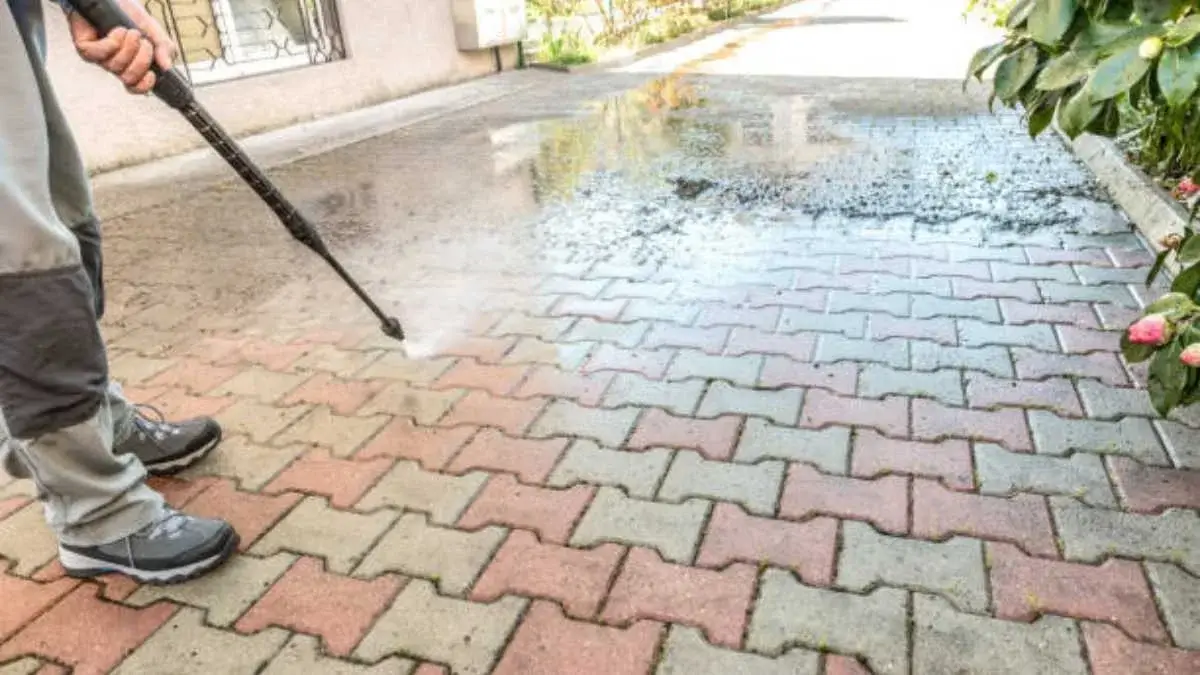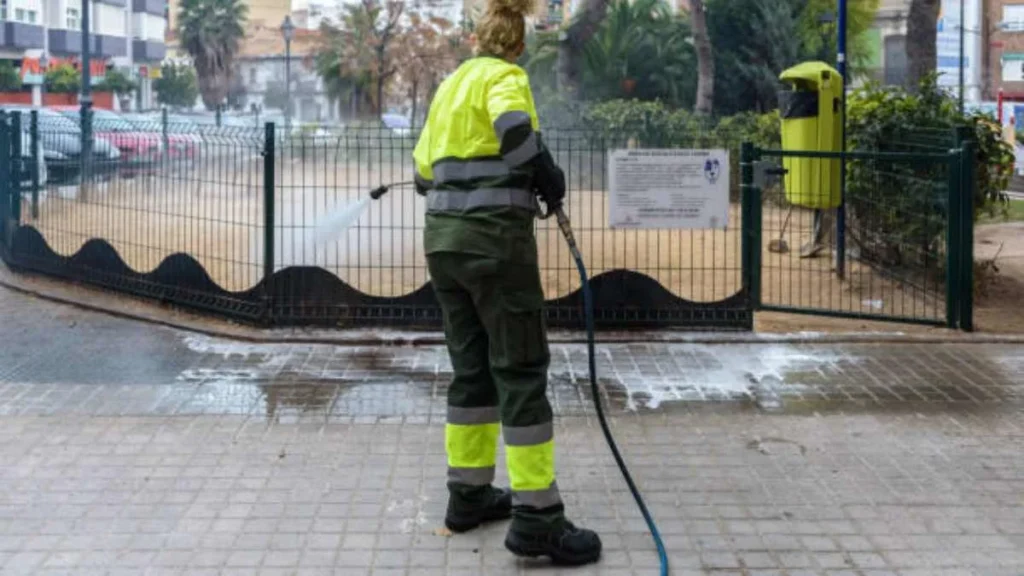GENERAL
The Importance of Pressure Washing in Maintaining Clean and Safe Urban Spaces

Maintaining clean and safe urban spaces is essential for ensuring that public areas remain welcoming and functional for residents, businesses, and visitors. Pressure washing plays a crucial role in the upkeep of outdoor environments, from sidewalks and parking lots to building exteriors and public infrastructure. By effectively removing dirt, grime, mold, and pollutants, pressure washing not only enhances the appearance of urban spaces but also contributes to public safety and the preservation of structures.
In this article, we will explore the various benefits of pressure washing and how it contributes to maintaining clean, attractive, and safe environments in cities, parking lots, and commercial areas.
1. Enhancing Public Health and Safety with Pressure Washing
One of the most significant advantages of pressure washing is its ability to improve public health and safety. Over time, urban surfaces like sidewalks, parking lots, and building exteriors accumulate dirt, oil, and other contaminants that pose risks to both pedestrians and the structural integrity of the environment.
Key Safety Benefits of Pressure Washing:
- Reducing Slippery Surfaces: Spilled liquids, oil stains, and grime buildup on sidewalks and parking lots can create slippery surfaces, increasing the risk of slips and falls for pedestrians. Regular pressure washing removes these hazards, making outdoor spaces safer for foot traffic.
- Eliminating Mold and Mildew: In humid climates, mold and mildew can thrive on building exteriors, walkways, and other surfaces. These substances not only degrade the appearance of the area but also pose health risks, particularly to those with respiratory issues. Pressure washing effectively removes mold and mildew, promoting a healthier environment.
- Preventing Bacterial Growth: Areas exposed to heavy foot traffic or close to waste disposal zones are prone to the buildup of bacteria and other harmful pathogens. Regular pressure washing disinfects these areas, reducing the risk of disease transmission and maintaining a clean, sanitary environment.
By proactively using pressure washing to maintain clean surfaces, property managers and municipalities can significantly reduce health and safety risks in public areas.
2. Extending the Lifespan of Infrastructure and Pavement
Regular pressure washing is not only about maintaining cleanliness; it’s also a key factor in preserving the longevity of various urban infrastructure components. Over time, contaminants such as dirt, chemicals, and pollutants can degrade the materials used in sidewalks, parking lots, and building exteriors. Without regular cleaning, these materials can weaken, crack, or erode.
How Pressure Washing Preserves Structures:
- Preventing Corrosion: Metal surfaces, including railings, fences, and outdoor structures, are susceptible to rust and corrosion when exposed to pollutants and moisture. Pressure washing removes corrosive agents, such as salts and chemicals, helping to preserve the integrity of metal fixtures.
- Protecting Pavement and Concrete: Oil spills, chemical leaks, and grime can penetrate the porous surfaces of concrete and pavement, leading to deterioration. Over time, these substances can cause cracks and potholes, requiring costly repairs. Pressure washing cleans the surface and prevents contaminants from seeping into the pavement, ultimately extending the lifespan of streets, parking lots, and sidewalks.
- Maintaining Aesthetic Appeal: In addition to preventing structural damage, regular pressure washing keeps surfaces looking clean and well-maintained. Clean buildings, sidewalks, and public spaces create a positive impression on residents and visitors alike, boosting property values and community pride.
Regular pressure washing should be an integral part of any pavement maintenance or building upkeep program, as it helps to preserve materials and reduce the need for expensive repairs or replacements.
3. Improving Environmental Sustainability with Pressure Washing
While pressure washing is an effective cleaning method, it also has environmental benefits when performed responsibly. By using water-efficient equipment and eco-friendly cleaning solutions, pressure washing can contribute to sustainability efforts in urban areas.
Environmental Advantages of Pressure Washing:
- Preventing Harmful Runoff: When pollutants such as oil, grease, and chemicals accumulate on streets and sidewalks, they can eventually be washed into storm drains and local waterways, contributing to pollution. Pressure washing helps to remove these contaminants from surfaces before they enter the drainage system, thereby reducing the environmental impact.
- Reducing Water Waste: Modern pressure washing equipment is designed to minimize water consumption while still providing powerful cleaning. By using high-pressure, low-flow systems, pressure washing achieves deep cleaning with less water, making it an environmentally conscious solution for urban cleaning needs.
- Eco-Friendly Cleaning Agents: Many professionals use biodegradable and eco-friendly detergents to ensure that cleaning solutions don’t harm local ecosystems. These agents effectively break down dirt and grime without introducing toxic chemicals into the environment.
By incorporating pressure washing into a broader sustainability strategy, cities and businesses can maintain clean spaces while minimizing their environmental footprint.
4. Enhancing Curb Appeal for Commercial and Public Spaces
For businesses and public spaces alike, the appearance of building exteriors, sidewalks, and parking lots plays a major role in shaping public perception. Clean and well-maintained spaces create a welcoming atmosphere, while dirty or unkempt surfaces can deter customers and visitors.
Pressure Washing and Curb Appeal:
- Improving Business Image: For businesses, first impressions matter. Clean building exteriors and spotless parking lots suggest professionalism and care, attracting more customers and enhancing the overall business image. Regular pressure washing ensures that these areas remain visually appealing.
- Public Space Maintenance: In cities, public spaces such as parks, plazas, and sidewalks are high-traffic areas that can quickly accumulate dirt, litter, and other unsightly debris. Pressure washing helps municipalities maintain these public areas, ensuring they are inviting and enjoyable for residents and visitors.
- Attracting New Tenants: Property owners of commercial buildings and multifamily apartment complexes can enhance the attractiveness of their properties through regular pressure washing. Clean and well-maintained common areas, including parking lots and walkways, make the property more appealing to potential tenants, contributing to higher occupancy rates and property value.
In both commercial and public spaces, pressure washing is an essential tool for maintaining a clean, professional, and appealing environment that reflects positively on the business or community.

5. Pressure Washing as Part of a Comprehensive Maintenance Plan
For property managers, pressure washing should be seen as one element of a broader maintenance plan that includes regular pavement maintenance, cleaning, and repair. By incorporating pressure washing into routine upkeep schedules, property owners can avoid the accumulation of grime and contaminants that degrade surfaces over time.
Incorporating Pressure Washing into Maintenance Plans:
- Scheduling Regular Cleanings: Establishing a regular pressure washing schedule ensures that surfaces remain clean year-round. The frequency of cleanings may vary based on factors such as foot traffic, weather conditions, and the type of property (e.g., commercial, residential, or public). High-traffic areas like parking lots and city sidewalks may require more frequent attention.
- Combining Services for Maximum Impact: For the most comprehensive approach to property maintenance, pressure washing can be combined with other services like street sweeping and parking lot sweeping. Together, these services provide a holistic cleaning solution that keeps both surfaces and surrounding areas free from debris, oil stains, and other contaminants.
- Protecting Property Investments: Regular cleaning through pressure washing helps to protect investments in infrastructure by preventing long-term damage caused by neglect. This not only saves money on repairs but also ensures that properties retain their value over time.
Integrating pressure washing into a property’s maintenance routine ensures that outdoor surfaces stay clean, safe, and appealing for years to come.
Conclusion
Pressure washing is a vital component of urban cleanliness, providing significant benefits in terms of public safety, infrastructure longevity, and environmental sustainability. By removing harmful contaminants, enhancing curb appeal, and preserving the integrity of surfaces, pressure washing contributes to the overall maintenance and functionality of both public and commercial spaces.
Whether it’s for parking lots, sidewalks, or building exteriors, pressure washing is an essential tool for maintaining urban environments. Working with experienced professionals like Cleaner Streets ensures that pressure washing services are performed efficiently and responsibly, helping property managers and municipalities maintain clean, safe, and sustainable spaces.
-

 GENERAL6 months ago
GENERAL6 months agoChristofle – For Those Who Dream of Family Heirloom Silver
-

 SPORTS8 months ago
SPORTS8 months agoDiscover the World of Football with Streameast: Watch Your Favorite Leagues and Tournaments
-

 GENERAL6 days ago
GENERAL6 days agoUncovering the World of кинокрадко: The Dark Side of Film Piracy
-

 GENERAL3 months ago
GENERAL3 months agoATFBooru: Anime, Gaming, and Subculture Imageboard


























